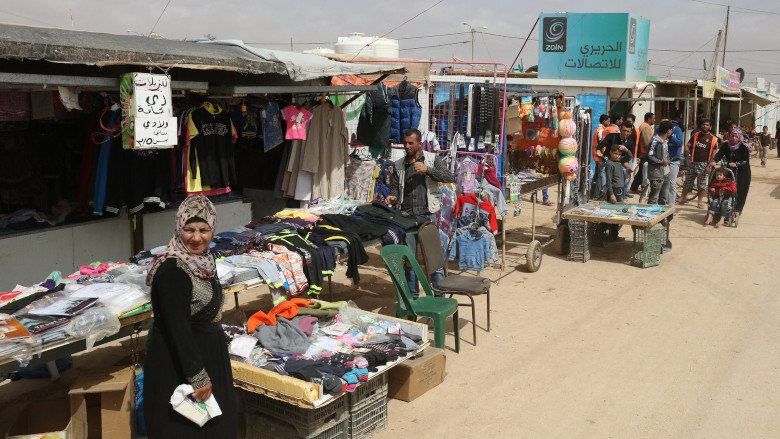Challenge
At the end of 2022, 108.4 million people were forcibly displaced worldwide. Most of them live in developing countries and two-thirds of refugees were estimated to have been displaced for more than five years. Humanitarian organizations are not set up to provide relief in the long term. Hosting countries face significant challenges in meeting their own development goals while accommodating people displaced for a long time --often in areas where local communities themselves lack basic services and resources.
Approach
The WBG supports member countries in addressing the needs and aspirations of those forcibly displaced and also of their host communities. Its medium-term development perspective complements the emergency relief activities of humanitarian organizations and focuses on tackling longer-term, social and economic challenges --especially jobs and education-- and on closing gender gaps by empowering women and girls. The Bank works with partners to produce better data and analytics that inform results-driven strategies; to develop innovative financing mechanisms that address the variety of forced displacement situations; and to implement effective operations on the ground. The Bank also developed the to provide a methodology for systematically reviewing the refugee policy and institutional environments in countries eligible for WBG support. This approach aligns with Sustainable Development Goal 1, and the .
Results
- Horn of Africa: The (DRDIP) is a $630 million regional operation in the Horn of Africa covering Djibouti, Kenya, Uganda, and Ethiopia. The project seeks to mitigate the social, economic and environmental impacts of protracted refugee presence while also maximizing the opportunities offers. As of May 2023, 5.5 million people, of whom 53 percent are women, have benefited from improved access to basic services such as education, health, water and sanitation. Livelihood activities have supported over 285,000 people with business grants and training on entrepreneurship, with 150,000 beneficiaries reporting an increase in income. 1,751 infrastructure subprojects targeting water, health and education facilities, and roads and markets have been completed, and another 595 are currently under construction. Nearly 400,000 people have been provided access to renewable energy. An additional US$3.4 million in funding was provided for the project in Kenya in December 2022 to cover cost increases for schools, health facilities, and water systems subprojects caused by the COVID-19 pandemic.
- The WBG-managed was set up in 2016 in response to the Syrian refugee crisis, to provide development support on concessional terms to middle-income countries impacted by refugee crises across the world. Between 2016 and December 2022, almost 1.8 million people received essential health or nutrition services under GCFF-supported operations; over 2 million refugees received the right to work in their hosting country; and over 1.2 million people benefited from improved access to infrastructure or municipal services. GCFF-supported operations have also supported 23 policy measures that codify or expand rights or protections for refugees and host communities.
- The $750m IBRD (DPF), with $31.5m grant financing from the GCFF, supported the government to implement policies to regularize and integrate Venezuelan migrants into Colombia. A 2018 World Bank research report, Migration from Venezuela to Colombia: Impacts and Response Strategy in the Medium and Long Term, informed the government��s policy actions to improve the migrants�� access to basic services and jobs. In 2019, 281,596 Venezuelan migrants, with women making up nearly 50 percent, obtained Special Permanent Stay Permits (Permiso Especial de Permanencia, or PEP). The permits helped regularize the migrants�� legal status, ensuring that they had access to education, healthcare, clean water and sanitation, housing and childcare services. They also enabled 76,744 job-seeking migrants to get services from the National Employment Agency.
- In Bangladesh, the ŷ����b��Ƭ Additional Financing for the has helped provide, since 2018, immunizations for over 87,000 displaced Rohingya children, has provided access to women-friendly services on sexual and reproductive health and rights and on gender-based violence for over 408,000 displaced Rohingya women and girls, and has increased from 4 to 98 the number of facilities providing an appropriate mix of family planning methods. Separately, the supported 234,000 displaced Rohingya children, trained 3,000 teachers in Cox��s Bazaar and supported over 1,300 learning centers in the refugee camps.
- In Chad, an ŷ����b��Ƭ grant has provided, through the , cash transfers reaching over 70,000 beneficiary households, including 21,000 refugees, between 2018 and 2022. The project is also supporting the capacity building of the National Commission for Refugees (CNARR) to execute its tasks in the refugee camps, benefitting over 200,000 refugees. Separately, the World Bank-UNHCR Joint Data Center on Forced Displacement in Copenhagen, Denmark, supported the Government of Chad to conduct a series of surveys on Chadian and refugee households. Insights from the analytical work helped the government design and pass an inclusive Asylum Law in December 2020, guaranteeing refugees freedom of mobility and equal access to health, education, and justice.
- In Ethiopia, the provided the impetus and financing for the adoption of the Refugees Proclamation, a new law granting more rights to refugees, which was passed in 2019. The Directives established since the passage of the Proclamation have enabled over 2,000 refugees to access residence permits for the first time, including under the Urban Productive Safety Net Project, where refugees and host communities have been engaged in public works and livelihoods activities. The support has helped improve incomes and social cohesion of refugees and host communities in targeted households.
- From 2015-2018, with a trust fund grant of $10 million, the assisted selected municipalities most affected by the influx of Syrian refugees to provide reliable and quality municipal services and social initiatives. The project helped to provide and distribute 12,423m3 of municipal water per day to 124,572 people, it collected 79 tons per day of solid waste for 42,584 beneficiaries, and enhanced mobility for 62,481 beneficiaries in 14 municipalities by connecting and rehabilitating existing roads to improve access to markets, schools, clinics, playgrounds, and community facilities.
